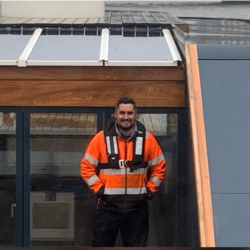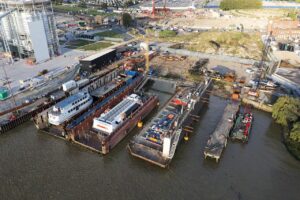Based in the centre of London, on the Greenwich Peninsula. Thamescraft has been servicing the Thames fleet since the 1980’s, but more recently the company has been working further afield…
Can you tell us about Thamescraft?
Thamescraft was set up as a boat yard on The River Thames nearly 40 years ago by my dad, Paul. We operate three floating dry docks in London. The business has always owned its own workboats that serviced the yard and in the last ten years or so the marine services side of the business has developed well and has become independent in itself.
What is your role within the Company?
My role is operations director, I’m based in London at our boat yard where I project manage dry-dockings as well as manage our fleet of tugs and multicats.
What is your career background?
I began working on the River Thames at the age of 16 and worked up from a deck hand to skipper. In my early 20’s I began to spend more time working in the dry-docking side of Thamescraft where I now spend most of my time.
What excites you most about your job?
I’ve had a keen interest in tugs since I was young. I’d spend my summer holidays playing around in small open workboats- now I get to play around with much bigger ones. I enjoy the wide variety of tasks our vessels carry out, from towing to plough dredging and everything in between.
What are your hobbies outside of work?
When I’m not working, I try to spend as much time as I can with my daughters, Emilia and Sophia who both have multicats named after them.
What has Thamescraft achieved so far?
We have worked on some brilliant marine civils projects in recent years. Most of these have been on the Thames, but in the last few years we’ve begun working further afield. Last year we worked on the Hinkly Point project for DEME and also in the Outer Hebrides.
What are your goals for Thamescraft?
I’d like to see us continue the path we’re on, progressively modernising our fleet, working up to larger vessels and continuing to work on interesting projects.
Why did you decide to become a member of The Workboat Association?
We’ve been lucky enough to receive a great deal of guidance from other WA members as we started out in the industry, it just made sense for us to become part of the community.
How do you feel The Workboat Association can benefit you?
We use the various training and good practice aids regularly as we develop our management systems and train our crews. It’s really helpful how the association notifies us of any changes in code or regulation that will affect our business too.


